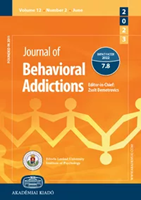Reducing problematic pornography use with imaginal retraining–A randomized controlled trial
Reducing problematic pornography use with imaginal retraining–A randomized controlled trial
Author(s): Anna BAUMEISTER, JOSEFINE GEHLENBORG, LEA SCHUURMANS, STEFFEN MORITZ, Peer BrikenSubject(s): Clinical psychology, Behaviorism, Substance abuse and addiction
Published by: Akadémiai Kiadó
Keywords: problematic pornography use; online intervention; compulsive sexual behavior disorder; approach bias modification;
Summary/Abstract: Background and aim: Problematic pornography use (PPU) can be a manifestation of compulsive sexual behavior disorder (CSBD). Studies investigating PPU confirm approach-avoidance tendencies in response to pornographic stimuli in this population. This study show indications of the significance of the efficacy of imaginal retraining, a variant of approach bias modification, as an intervention for PPU. Methods: A total of 274 participants (86.5% male; mean age 5 30.65, SD 5 10.13) with self-reported PPU were randomized to imaginal retraining (instruction video) or a waitlist control group. Assessments were conducted online at baseline and after the six-week intervention period. The primary outcome was a reduction in problematic pornography use. Compulsive sexual behavior, sexual desire, depressiveness, and satisfaction with the intervention served as secondary outcomes. Results: Retention was low (51.7%), but comparable between groups. The retraining was performed at least once a week (the per-protocol [PP] criterion) by 51.4% of participants. The PP analyses of 111 participants showed a significant reduction in problematic pornography use (primary outcome) in the intervention compared to the control group. The intention-to-treat analyses (ITT), however, did not corroborate this result. Despite low adherence, participants rated their satisfaction with the intervention positively. Discussion and Conclusion: Imaginal retraining can function as a low-threshold self-help intervention for PPU to overcome help-seeking barriers and may reduce PPU in a subgroup of users. Low adherence limits the results of this trial. Given the need for low-threshold interventions for PPU and/or CSBD, further research should focus on increasing adherence and should evaluate retraining for clinical groups. Modifications to augment efficacy are suggested.
Journal: Journal of Behavioral Addictions
- Issue Year: 13/2024
- Issue No: 2
- Page Range: 622-634
- Page Count: 13
- Language: English

